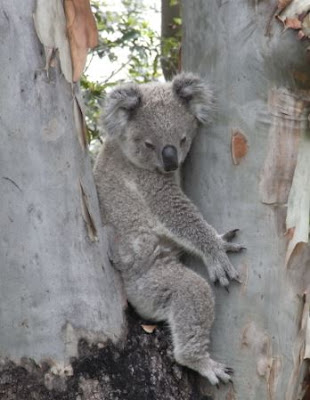On
26 February 2011 Professor Peter Timms of the Qld University of Technology
delivered an address on progress towards developing a vaccine for chlamydia
disease in koalas
Two types of chlamydia bacteria are known in koalas - Chlamydia pneumoniae, which is also found in all humans worldwide and of lesser importance
in koalas - and Chlamydia
pecorum, the most common and deadly strain.
In its active form the bacteria infect a koala's urogenital
tract rendering them infertile, and will ultimately cause the death of the
koala. So with up to 50% of koalas called in to wildlife rescue groups showing clinical
signs of the disease, a vaccine to eliminate the problem could also ultimately
save the koala from extinction.
At the time of his address Timm’s research was nearing the
end of its first phase, with 18 female koalas from the Lone Pine Koala
Sanctuary about to complete their vaccinations. The next phase was to immunise koalas
that had undergone treatment for ocular and urogenital chlamydia, and the third
stage would then identify variations between cell wall molecular make-up across
Queensland, NSW and Victoria. After that trials would start on male koalas.
At that point, delivery of the antigens by a simple
nose-drop form would also be tested, and a further plan was to develop a boutique
drug of possibly up to 10 antigens in a single dose, including an antigen for
retrovirus, a lethal immune deficiency in koalas akin to AIDS.
It is exciting to learn that the final stage of research is now
completed, with a 30-day 'burst relief' capsule lodged under the skin of wild
koalas administering a single dose of antigens, safely avoiding a buildup of tolerance
for the chlamydia bacteria, and without any adverse effects.
Although
it has been a long and winding road for this team, they deserve a medal for their
efforts in helping to save a globally-adored iconic animal.
However
the causes of the stress-related disease in koalas will still be present, so it
rests on us now to ensure these are properly addressed.
- Patricia Edwards
This article was originally published in the VOICES FOR THE EARTH column in The Daily Examiner on December 10, 2018.

